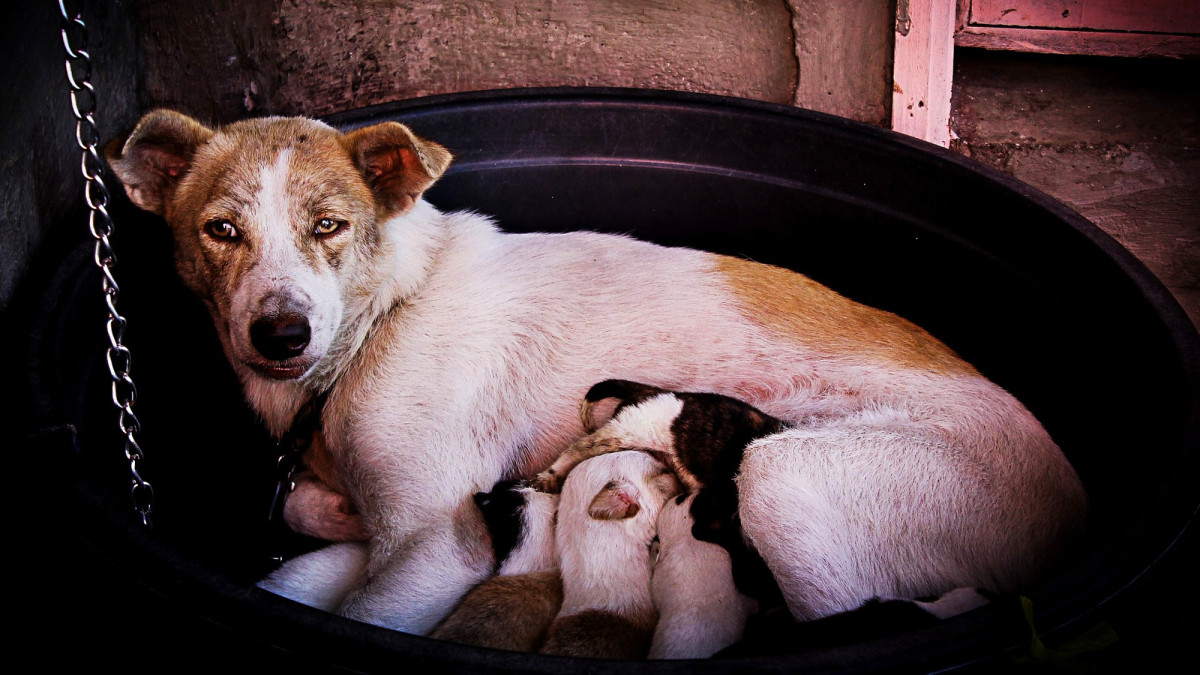
How Do I Get My Dog to Drink Water After Giving Birth?
My dog is not drinking after delivering puppies, and I do not have the money to take her to the vet. What can I do?
“My dog had 13 puppies, sadly 5 died. She had mange during her pregnancy but seemed to get better. I’m worried because she has been leaking a lot of thick, dark, greenish-brown discharge. I called the vet here, but I have no money, so they couldn’t see her and told me just to monitor her. If there is a dead puppy inside, what do I do without any vet help because they refused to see her without money?
Also, she’s been eating a little but refusing water—even milky water. I am just hoping she’s okay.”—Steven
Making Sure Your Dog Is Drinking and Eating
You mentioned that she is not drinking, but not how the surviving puppies are doing. If she is producing milk, then she is drinking. If she is still producing milk, the puppies are not going hungry, and she is eating at all, she may be fine.
Make sure that she has plenty of fresh water available at all times, and try to provide some warm (not hot) chicken broth to encourage her to drink even more. Follow the tips in this article about encouraging a dog to eat and drink to get your dog to eat more and produce more milk for her puppies.
Signs of a Uterine Infection
The discharge may be normal, but it could be that she has an infection in her uterus secondary to a retained placenta. (A dead puppy is a possibility, too, but much less likely.) Some discharge after giving birth (lochia) is normal, and dogs with a uterine infection from a retained placenta usually have more symptoms than just not drinking.
One way you might tell she has an infection and not just a normal discharge is that the infection secondary to a retained placenta usually smells a lot worse, like roadkill.
What Causes a Uterine Infection After Giving Birth?
Some of the other things that make her more likely to develop a uterine infection (1) include:
- A retained placenta
- A large litter
- Long delivery
- Needing help to deliver the puppies
- Poor condition (You did not say what kind of shape she was in before giving birth to the puppies, but if she was thin after the bout of mange, this would make a uterine infection more likely.)
How Can You Tell?
Unfortunately, there is no way to tell for sure if she has a uterine infection without an examination, and sometimes even that is not enough she will need bloodwork (a CBC) to see if she has an infection and possibly a microscopic exam of the discharge to see if there are a lot of bacteria present.
If her cervix is still open, sometimes dogs will do fine with just an injection of medication that causes her to pass the retained placenta and anything still inside the uterus. Some dogs will also need antibiotics, but it is impossible to say for sure.
No Money? Consider Giving Your Dog to a Shelter
This is not something you can take care of at home. If you cannot take her to your local veterinarian I would suggest you call a local dog breeder but if you do not know anyone you can call your local animal shelter and ask if they have anyone that can look at her. Puppies are expensive and they will expect you to have the funds to take care of any emergencies. It depends on the shelter, but some will require that you give up the dog before they will treat her.
Uterine Infections Require Medication
If you are not able to take her to your vet and you do not want to take her to a shelter, I can not tell you for sure that she is going to live. I would recommend that you check her body temperature.
If she has a fever, she has some sort of infection, most likely from the retained placenta, and you are going to have to do something. Dogs with a retained placenta or a dead puppy probably have an active infection, and if the dog becomes septicemic, she will die without medication.
If she has a fever, the discharge smells very bad, she starts vomiting, or if the puppies are weak and crying constantly, you need to get help right away.
Sources
- Rosenberg LM, Marinoff J, Crouch EE, Valenzano DM, Peters-Kennedy J, Cheong SH, de Amorim MD. Uterine perforation secondary to metritis and placenta percreta in a postpartum bitch. Can Vet J. 2020 Jun;61(6):584-588. PMID: 32675809; PMCID: PMC7236632. https://www.ncbi.nlm.nih.gov/pmc/articles/PMC7236632/
This article is not meant to substitute for diagnosis, prognosis, treatment, prescription, or formal and individualized advice from your veterinarian. Animals exhibiting signs and symptoms of distress should be seen by a veterinarian immediately.
© 2024 Mark dos Anjos, DVM


